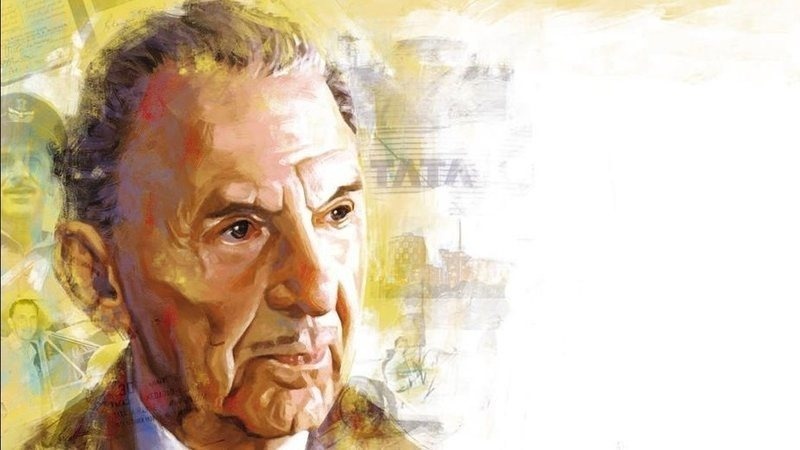Amid the controversy over the naming of the greenfield airport at Navi Mumbai, a member of the Tata family has thrown in the hat for JRD Tata, who brought civil aviation to India.
“I respectfully suggest that the new airport at Navi Mumbai should be named after JRD Tata, the father of Indian aviation,’’ said Piloo Tata, a member of the Tata family. Piloo Tata is the widow of Minocher Tata, whose grandfather and Jamsetji Tata, founder of Tata group, were siblings.
Article by Manju V | Times of India
Last week, the state government announced its decision to name the Navi Mumbai airport after Shiv Sena founder late Bal Thackeray. On the other hand, project-affected locals have demanded that the airport be named after late D B Patil, the leader of Peasant and Workers Party (PWP).
Into the foray is now the name of a candidate whose name is intertwined with Indian aviation history. Jehangir Ratanji Dadabhoy Tata flew the historic 1932 inaugural flight, carrying airmail from Karachi’s Drigh Road Aerodrome to Mumbai’s Juhu aerodome aboard Tata Airlines.
“J R D Tata pioneered aviation in India, and was responsible for starting our national airline, first known as Tata Airlines, and then renamed Air India after it was nationalised. He headed Air India as its Chairman for decades with great passion. He put India on the international aviation and tourism map. I cannot think of any other name which would be more appropriate to be linked with our International Airport,’’ said Tata, speaking to TOI.
“In memory of this undisputed pioneer of civil aviation in India, and in appreciation of the international passenger airline he started, I appeal to the authorities concerned to name the new airport at Navi Mumbai, the ‘J R D Tata International Airport’. He is the most deserving person for this honour. His name should be remembered and linked with Indian civil aviation for ever, ” she said.
Unlike India, most of the countries with aviation history dating back to the fledgling years in the first half of the twentieth century have airports named after their aviation pioneers.
In the US, the birthplace of aviation there is a strong tradition of honoring aviation pioneers. California’s San Diego international airport is named after Charles Lindbergh, Dayton airport honors Wright brothers, Atchison-Kansas airport is named after Amelia Earhart. Some other examples are Milwaukee airport, named after William “Billy” Mitchell, an American military aviation pioneer, Chicago-O’Hare named after naval aviator Edward H. “Butch” O’Hare and Oklahoma airport named after Wiley Post, the first pilot to fly solo around the world.
Among the examples in other countries are Sydney international airport which takes its name from Sir Charles Kingsford Smith, who operated the first trans-Pacific flight from US to Australia. Turkey’s Istanbul airport is named after Sabiha Gokcen, the first female Turkish fighter pilot. Lyon airport in France named after Antoine De Saint-Exupery, the pioneer of international postal flights.
In India, not a single airport is named after an aviation pioneer. Airports largely honor former Prime Ministers, freedom fighters or historical figures. Among the airports named after prime ministers are the Delhi airport named after Indira Gandhi, Hyderabad (Rajiv Gandhi), Deoghar in Jharkhand named after Atal Bihari Vajpayee, Varanasi (Lal Bahadur Shastri) and Lucknow (Chaudhary Charan Singh). Those named after freedom fighters include Ahmedabad (Sardar Vallabhbhai Patel), Port Blair (Veer Savarkar), Patna (Jay Prakash Narayan), Kolkata (Subhash Chandra Bose), Nagpur (Dr B R Ambedkar), Ranchi (Birsa Munda). Among the airports named after historical figures are Mumbai (Chhatrapati Shivaji), Indore (Ahilyabai Holkar), Bengaluru (Kempe Gowda, who was a chieftain under the Vijayanagara Empire) and Jaipur (Maharana Pratap). Then there are some exceptions like the Durgapur airport in West Bengal which is named after Bengali poet, writer, musician Kazi Nazrul and the Srinagar airport is named after Kashmiri Sufi saint Sheikh Ul-Alam (Nund Rishi), Amritsar after saint Ramdas and Bhopal after Raja Bhoj of the Paramara dynasty.

